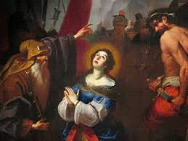 Saint Dorothy
Saint Dorothy
Virgin and Martyr(† 311)
Feast-February 6
St. Dorothy was a pious Christian girl, distinguished by her great beauty, humility, prudence, and God-given wisdom which astonished many. She lived in the city of Caesarea, in Cappadocia, Asia Minor. Her parents are believed to have been martyred before her in the Diocletian persecution.
Theophilus, a rich and handsome young man, fell in love with St. Dorothy and wished to marry her, but she refused because he was a pagan. If he would first learn about Jesus Christ and become a Christian, then she would marry him, if it is God’s Holy will. This angered Theophilus so much, that he reported to Sapricius the Governor of Caesarea that she will not marry him or sacrifice to the idols, because she is a Christian!”
Governor Sapricius called her to appear before him. Before long, The Governor’s guards were at Dorothy’s house. They seized her and almost dragged her, so rude were they, and they threw her into a dirty old dungeon. The next day he sent her to the eternal home where they were waiting for her.
She explained that the God she adored was majestic — above all emperors, who were mortal, and their gods, none of whom created either heaven or earth. She was stretched upon the rack, and offered honors if she would consent to sacrifice, or death if she refused; And they waited. She asked why they delayed torturing her; they were expecting she might cede out of fright. She said to them, “Do what you have to do, that I may see the One for whose love I fear neither death nor torments, Jesus Christ.” She was asked, “Where is this Christ?” and she replied: “As Almighty He is everywhere, but for weak human reason we say that the Son of God has ascended into heaven, to be seated at the right hand of the Almighty Father. It is He who invites us to the garden of His delights, where at all times the trees are covered with fruits, the lilies are perpetually white, the roses ever in their freshness. If you believe me, you too will search for the true liberty, and will labor to earn entry into the garden of God’s delights.” She was then placed in the custody of two women Calista and Christeta who had fallen away from the faith, in the hope that they might pervert her. Calista and Christeta resisted and argued at first, but Dorothy was kind and patient and she asked the Guardian Angels of the two women to help them come back to the Faith. Before long, the two women were weeping and begging God to forgive them for leaving the Faith. They realized what a terrible mistake they had made and asked St. Dorothy,” pray for us that our cowardly sin may be forgiven by God and that He will accept our penance.” Then the two sisters left the dungeon and cried, “We are Christians! We belong to Jesus Christ the true God, and we will follow Him to our death!” The Governor was furious at Calista and Christeta, he commanded guards to burn two women alive and to bring St. Dorothy to watch them burn, hoping that she may change her mind. St. Dorothy was again subjected to tortures. When she was set once more on the rack, Sapricius himself was amazed at the heavenly expression on her face and asked her the cause of her joy. “Because,” she said, “I have brought back two souls to Christ, and because I shall soon be in heaven rejoicing with the Angels.” Her joy grew as she was buffeted in the face and her sides were burned with plates of red-hot iron. “Blessed art Thou,” she cried, when she was sentenced to be beheaded, “Blessed art Thou, O Lover of souls, who calls me to paradise, and invite me to Thy nuptial chamber!”
As they led the saint to execution in mid-winter, Theophilus, one of the governor’s counselors, laughed and said to her, “Bride of Christ, send me an apple and some roses from the Paradise of your Bridegroom.” The martyr nodded and said, “I shall do that.”
At the place of execution, the saint requested a little time to pray. When she finished the prayer, an angel appeared before her in the form of a handsome child presenting her three apples and three roses on a pure linen cloth. She told him to take them to Theophilus, and to tell him it was the present he sought from the garden of her Spouse, after which she was beheaded by the sword.
Saint Dorothy had gone to heaven, and Theophilus was still making merry over his challenge to her, when the child entered his room. Having received the gracious gift, Theophilus was shaken, and he confessed Christ as the true God. His friends were astonished, and wondered whether he was joking, or perhaps mad. He assured them he was not. They then asked the reason for this sudden change. He asked what month it was. “February,” they replied. “In the winter, Cappadocia is covered with ice and frost, and the trees are bare of leaves. What do you think? From where these apples and flowers come?” After being subjected to cruel tortures, St. Theophilus was beheaded with a sword.
The relics of St. Dorothy are in Rome in the church dedicated to her, and her head is also at Rome, in a church of the Mother of God at Trastevero.
She is regarded as the patroness of gardeners, brewers, brides, florists, midwives and newlyweds.
References and Excerpts
[1] “Saint Dorothy, Virgin and Martyr.” [Online]. Available: http://sanctoral.com/en/saints/saint_dorothy.html. [Accessed: 01-Feb-2019].
[2] “Dorothea of Caesarea – Wikipedia.” [Online]. Available: https://en.wikipedia.org/wiki/Dorothea_of_Caesarea. [Accessed: 01-Feb-2019].
[3] “The Story of St. Dorothy.” [Online]. Available: http://fsspx.com/EucharisticCrusade/2006_November/St_Dorothy.htm. [Accessed: 01-Feb-2019].
[4] “St. Dorothy in Caesarea | Antiochian Orthodox Christian Archdiocese.” [Online]. Available: http://ww1.antiochian.org/node/17490. [Accessed: 01-Feb-2019].